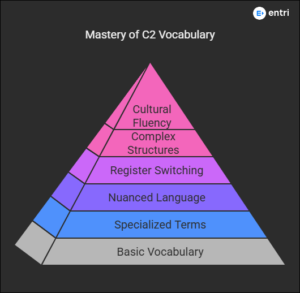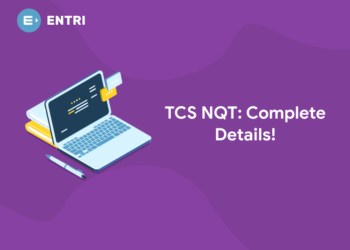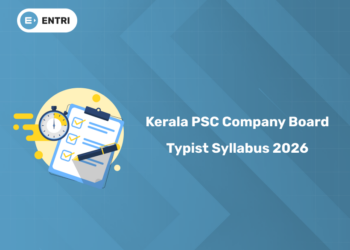Table of Contents
Introduction
Reaching the German C2 level is the ultimate milestone in the Common European Framework of Reference for Languages (CEFR). At this stage, you are considered nearly as proficient as an educated native speaker—you can read and understand complex literature, follow academic discussions, and express yourself with precision, fluency, and subtlety in any setting. Whether in professional workplaces, academic research, or intercultural communication, C2 proficiency guarantees linguistic excellence.
Check out this video by Entri in Malayalam!
Unlike beginner or intermediate stages where vocabulary focuses on day-to-day communication, German C2 vocabulary and grammar push you toward sophisticated expressions, abstract concepts, idioms, and field-specific terminology. This blog explores an extensive vocabulary list, advanced grammar structures, and effective strategies to help you conquer the C2 level and communicate at a near-native standard.
German C2 Exam: What You Need to Know
1: How do you say "Good Morning" in German?
The Goethe-Zertifikat C2: Großes Deutsches Sprachdiplom (GDS) is the official certification for proving your German proficiency at the C2 level. It demonstrates that you can understand virtually everything you read or hear, and that you can express ideas accurately, fluently, and effectively in both written and spoken German.
1. Skills Tested at C2 Level
The C2 exam evaluates your ability to:
-
Reading (Lesen): Comprehend abstract, literary, scientific, and academic texts, even when they are linguistically demanding or contain hidden meanings.
-
Listening (Hören): Understand extended speech, lectures, debates, and media broadcasts with ease—even when spoken at a fast pace.
-
Writing (Schreiben): Produce advanced written texts such as academic essays, research reports, newspaper articles, or professional documents with coherent, structured, and stylistically appropriate language.
-
Speaking (Sprechen): Discuss complex topics fluently and spontaneously, hold debates with strong arguments, and adapt your register to both formal and informal situations.
2. Exam Duration & Structure
-
Reading & Listening: approx. 80–120 minutes each
-
Writing: approx. 80–90 minutes
-
Speaking (oral exam): approx. 15–20 minutes (individual or paired)
3. Importance of C2 Certification
-
Academic Value: Recognized globally as proof of highest German proficiency. Some universities and research institutions require C2 for advanced academic programs.
-
Professional Advantage: Enhances eligibility for senior positions in multinational companies, law, journalism, education, and translation.
-
Immigration & Integration: Acts as strong proof of integration for residency and professional permits in Germany, Switzerland, and Austria.
4. Preparation Time
Achieving C2 fluency typically requires 1000–1200+ study hours, continuous immersion, and practice using advanced resources (literature, academic texts, professional media).
Click here to join the Entri online German language course! Watch demo classes here!
Free German A1 Mock Tests – Powered by AI!
Test your skills on our interactive platform. Get instant feedback from our AI to help you communicate better and track your progress. Start your free German mock test now.
Test Your German A1 for FreeCharacteristics Of German C2 Vocabulary
- The vocabulary at this level consists of both complex and exact terminology, enabling the exchange of subtle and meaningful ideas. Sophisticated verbs, descriptive adjectives with nuanced meanings, and abstract nouns all require a deep comprehension of them.
- At this level of proficiency, one must be able to transition between formal and informal language registers with accuracy and grasp the nuances of audience and situation.
- The vocabulary includes terms from academics, science, commerce, law, and technology. Advanced students can debate and comprehend complex subjects within particular fields because of this specialization.
- A feature of C2 vocabulary is its wide range of synonyms and its capacity to select the best term for a particular situation. This also entails being aware of minute variations in the usage and meaning of terms that are identical.
- It is crucial to become proficient in slang terms and idioms. Because of cultural quirks and common usage, these phrases frequently have meanings that are not immediately clear from the individual words.
- Complex grammatical constructions like as nominalization, split sentences, inversion, passive voice, relative clauses, subjunctive mood (Konjunktiv II), and related clauses frequently employ C2 vocabulary. These structures improve the capacity for sophisticated and precise cognitive expression.
Also read: Best German Grammar Books for Learning Possessive Pronouns
German C2 Vocabulary List
When you can communicate in German at a C2 level, you are quite proficient. This extensive guide will assist you with terminology that is beyond your level. Mastering C2-level German requires knowledge of the specialist terminology, colloquial idioms, and sophisticated grammatical structures included in this list.
Explore our free German language learning materials now!
German C2 General Vocabulary
Abstract Nouns
- Die Effizienz – efficiency
- Die Erleuchtung – enlightenment
- Die Feindseligkeit – hostility
- Die Fragilität – fragility
- Die Integrität – integrity
- Die Koexistenz – coexistence
- Die Nuance – nuance
- Die Präzision – precision
- Die Resilienz – resilience
- Die Spezifikation – specification
- Die Transparenz – transparency
Adjectives
- Adept – adept
- Ambivalent – ambivalent
- Bedeutend – significant
- Besonnen – prudent
- Differenziert – nuanced
- Effizient – efficient
- Erheblich – considerable
- Explizit – explicit
- Fundamental – fundamental
- Grazil – graceful
Verbs
- Abstrahieren – to abstract
- Akkumulieren – to accumulate
- Antizipieren – to anticipate
- Beschleunigen – to accelerate
- Diversifizieren – to diversify
- Etablieren – to establish
- Implizieren – to imply
- Integrieren – to integrate
- Kollabieren – to collapse
- Manifestieren – to manifest
- Optimieren – to optimize
- Priorisieren – to prioritize
- Rekonstruieren – to reconstruct
- Spezifizieren – to specify
- Transzendieren – to transcend
German C2 Specialized Vocabulary
Scientific and Technical
- Die Quantenmechanik – quantum mechanics
- Die Biotechnologie – biotechnology
- Der Algorithmus – algorithm
- Die Nanotechnologie – nanotechnology
- Die Thermodynamik – thermodynamics
- Die Astrophysik – astrophysics
- Die Genetik – genetics
- Die Künstliche Intelligenz – artificial intelligence
- Die Molekularbiologie – molecular biology
- Die Kryotechnik – cryogenics
Academic and Professional
- Die Dissertation – dissertation
- Das Gutachten – expert report
- Die Methodologie – methodology
- Die These – thesis
- Die Hypothese – hypothesis
- Der Diskurs – discourse
- Die Validität – validity
- Die Analyse – analysis
- Die Synthese – synthesis
- Die Implementierung – implementation
- Business and Economics
- Die Bilanz – balance sheet
- Die Dividende – dividend
- Die Inflation – inflation
- Die Deflation – deflation
- Der Marktanteil – market share
- Die Rentabilität – profitability
- Die Subvention – subsidy
- Die Konjunktur – economic cycle
- Das Bruttoinlandsprodukt (BIP) – Gross Domestic Product (GDP)
- Die Wirtschaftspolitik – economic policy
|
Goethe 2025 Exam Dates: Multiple Centers |
|
| Trivandrum Goethe Exam Dates | Kochi Goethe Exam Dates |
| Chennai Goethe Exam Dates | Coimbatore Goethe Exam Dates |
German C2 Advanced Level Grammar Structures
Subjunctive II (Konjunktiv II)
Used to make courteous requests, speak indirectly, or in hypothetical or fictitious scenarios.
eg:
Wenn ich reich wäre, würde ich um die Welt reisen. – If I were rich, I would travel around the world.
Nominalization
Used to convert adjectives and verbs into nouns to give writing a more formal, scholarly tone.
eg:
Die Einführung neuer Technologien verbessert die Effizienz. – The introduction of new technologies improves efficiency.
|
German A2 Exercises – Download Free PDF |
||
Relative Clauses
Added to a noun to convey further context.
eg:
Die Frau, die im Park joggt, ist meine Nachbarin. – The woman who is jogging in the park is my neighbor.
Passive Voice
Used to highlight the activity itself, as opposed to the subject carrying it out.
eg:
Das Buch wurde von dem Autor geschrieben. – The book was written by the author.
Inversion
Used for emphasis or stylistic reasons, particularly in written German.
eg:
Nie hätte ich gedacht, dass das möglich wäre. – Never would I have thought that this was possible.
Cleft Sentences
Utilized to draw attention to a specific phrase element.
eg:
Was ich wirklich brauche, ist eine Pause. – What I really need is a break.
Click here to join the Entri online German language course! Watch demo classes here!
Tips to Increase C2 Vocabulary
There’s no easy way to learn and master German language like a native. The sensible choice would be to make use of tips on how to becomes rooted in the language. Here are some tips curated by us for you:
- Always strive to read advanced texts like literature, academic articles, and professional journals. This way you get to be exposed to a lot of complex terms that would easily rack up your brain!
- If you are a football fan, we would recommend watching the Bundesliga (professional football league in Germany) in the German language. This way you get to be accustomed to the various German names of the players and the cities. The same can be applied for news, movies, and podcasts.
- Remember, “practice makes perfect”. Strive to use complex vocabulary and practice them daily in your speech.
- Utilize web apps that help you to track your vocabulary level and usage.
Check out related blog posts written by the experts!
Free German A1 Mock Tests – Powered by AI!
Test your skills on our interactive platform. Get instant feedback from our AI to help you communicate better and track your progress. Start your free German mock test now.
Test Your German A1 for FreeGerman C2 level: Conclusion
To communicate fluently, subtly, and sophisticatedly, one must have mastered German C2 vocabulary, which is the highest level of linguistic ability. Advanced learners are able to navigate complex issues and discussions with ease because of the breadth and accuracy of their vocabulary as well as their mastery of specialist terms from all professions. A more genuine and organic communication style is achieved by the use of colloquial terms and cultural allusions.
Furthermore, appropriateness and intelligibility in a variety of settings are guaranteed by the capacity to employ complex grammatical structures and transition between formal and informal registers. Learning C2 vocabulary helps students become true communication experts by improving their language skills and gaining a greater understanding of the cultural and contextual richness of the German language.
Crack German Exam with the help of Online German Language Class designed by experts. The comprehensive German language course prepares you to read, write, and converse in German. It covers all the essential parts of the German language. You get access to live and recorded classes with experienced and certified faculties
| German Language Courses | |
| German Language A1 Course Online Coaching | German Language A2 Course |
| German Language B1 Course online Coaching | German Language B2 Course Online Coaching |
Free German A1 Mock Tests – Powered by AI!
Test your skills on our interactive platform. Get instant feedback from our AI to help you communicate better and track your progress. Start your free German mock test now.
Test Your German A1 for FreeFrequently Asked Questions
What does C2 level in German mean?
The C2 level is the highest proficiency stage in the CEFR framework. At this level, learners can understand virtually everything they read or hear, express themselves fluently and precisely, and adapt language use to any professional, academic, or social situation.
How difficult is the German C2 exam compared to C1?
The C2 exam is significantly more challenging than C1. While C1 focuses on advanced everyday and academic communication, C2 tests near-native mastery, requiring you to grasp abstract ideas, hidden meanings, idiomatic usage, and specialized terminology across multiple domains.
How long does it take to reach C2 in German?
On average, learners need around 1000–1200 study hours (from scratch) to reach C2. If you already hold C1, progressing to C2 can take an additional 6–12 months of intensive study and immersion.
What skills are tested in the Goethe C2 exam?
The Goethe C2 exam assesses:
-
Reading: Understanding complex literary, academic, and technical texts
-
Listening: Following fast-paced discussions, debates, or broadcasts
-
Writing: Producing advanced formal and academic texts
-
Speaking: Discussing complex topics fluently and persuasively
Is German C2 necessary for studying in Germany?
Not always. Most German-taught bachelor’s and master’s programs require C1, but C2 may be recommended for academic research, doctoral studies, or competitive programs in law, literature, and philosophy.
Who should aim for German C2?
C2 is ideal for:
-
Aspiring academics/researchers in German-speaking universities
-
Professionals in law, translation, journalism, or education
-
Individuals aiming for full linguistic and cultural integration in Germany, Austria, or Switzerland
What is the passing score for Goethe-Zertifikat C2?
Generally, a 60% score is required overall. However, each module (reading, listening, writing, speaking) needs to be passed, so balanced preparation is essential.
What resources are best for preparing for German C2?
-
Advanced literature, newspapers (Die Zeit, Frankfurter Allgemeine Zeitung)
-
Academic journals and research papers
-
German podcasts and debates
-
C2-level preparation books and Goethe exam practice sets
-
Expert-led courses offering mock tests and feedback
Is C2 German equivalent to a native speaker?
While C2 proficiency places you almost at par with an educated native speaker, slight differences may remain in cultural nuances, idiomatic expressions, and speed of speech. However, it is widely accepted as near-native mastery.
What comes after C2 German?
C2 is the final CEFR level. After reaching it, the focus shifts to maintaining proficiency, expanding domain-specific vocabulary, and staying updated with evolving usage (especially in professional and academic fields).













